Overview
Speaking and swallowing are vital to your physical function and social experiences. Many people take these important actions for granted. However, you know just how challenging life can be if you have difficulty communicating or swallowing.
Problems with your speech, voice, and swallowing also can affect your mental and physical health. Perhaps you feel anxious or frustrated, or maybe you avoid work and social events because of these difficulties. Trouble swallowing can make staying hydrated and well-nourished difficult, leading to choking hazards and infections.
The speech-language pathologists at Cleveland Clinic in Florida are experts in assessing and helping you overcome these disorders.
Speech-Language Pathology: Why Choose Cleveland Clinic in Florida?
If you come to Cleveland Clinic in Florida for assessment and treatment of a speech or swallowing issue, you’ll find:
- Specialized knowledge: Our speech-language pathologists are specially trained, licensed and certified by the American Speech-Language-Hearing Association. Two of our SLPs holds a Certified Brain Injury Specialists Certification. These credentials demonstrate our ongoing commitment to practicing the latest and most effective interventions available. Each team member subspecializes in a different area, so members of our team can provide specialized treatment for a variety of conditions.
- Caring approach: We understand the many ways that speech, voice, and swallowing problems can affect your life and compromise your well-being. We have experience interpreting those who struggle to communicate and we take time to listen to your story patiently and compassionately. We also offer interpreters to help all patients fully understand discussions about diagnosis and treatment.
- Comprehensive treatment: We design an individualized plan to help you improve speech, voice, and swallowing issues through therapeutic exercises and approaches. In addition, we help you learn and implement strategies to function better in work, school and social settings. Treatment plans are based on your condition, goals, and personal preferences.
- Collaborative care: We use a team-based approach, depending on your condition and needs. We collaborate with colleagues in otolaryngology (ear, nose and throat), neurology, gastroenterology, pulmonology, oncology, and nutrition.
- Convenient care: Our services are available on an outpatient and inpatient basis. We see you quickly and intervene promptly so you get the relief you need.
- Quality focus: We assess you during your first visit and then repeat assessments regularly to ensure you’re making noticeable progress. We use the latest proven approaches to ensure excellent outcomes throughout your care.
What Is Speech-Language Pathology?
A speech-language pathologist is a medical professional who works to prevent, assess, diagnose and treat speech, language, voice, communication and swallowing disorders.
Examples of communication disorders we treat include having difficulty with:
- Organizing thoughts before you speak.
- Producing certain speech sounds.
- Sharing or expressing thoughts, ideas and feelings.
- Understanding others.
- Using verbal and nonverbal forms of communication in social settings.
- Voice problems, such as the intensity and quality of your voice.
Examples of swallowing issues we can treat include:
- Choking frequently when eating or drinking.
- Coughing when you eat or drink.
- Drooling.
- Feeling like food gets stuck in your throat or your chest.
- Inability to swallow at all.
- Problems swallowing certain foods or liquids.
- Regurgitating food or beverages (it comes back up through your throat or nose).
Who Can Speech-Language Pathologists Help?
Our team helps people with a variety of communication and swallowing disorders caused by disease, deformity or disability. For example:
- Chronic cough (when it is due to oversensitive nerves in the larynx or “voice box”).
- Head and neck cancer or radiation therapy to treat cancer.
- Gastrointestinal diseases such as GERD (chronic acid reflux).
- Injury or surgery to anatomical structures of the face, neck and throat.
- Progressive neurologic conditions, such as Parkinson’s disease and amyotrophic lateral sclerosis (ALS).
- Pulmonary disorders such as chronic obstructive pulmonary disease (COPD).
- Stroke.
- Voice and vocal cord problems caused by overuse, stress, aging, and injury.
Learn more about diagnosis and treatment options from our speech-language pathologists.
Speech and Language Assessment and Diagnosis
Our expert speech-language pathologists start by talking with you to fully understand your symptoms, how they’re affecting your life and your personal goals. Your family is welcome to join these discussions. We also may conduct a brief physical exam, such as looking inside your mouth and throat or feeling your neck.
We also may recommend one or more tests if the results can help us determine the best course of treatment. All of our tests are minimally invasive. We conduct them on-site so you don’t have to travel to multiple appointments, and we get prompt results.
Procedures to assess speech, language and communication
- Laryngoscopy: We use a telescopic tube with a light and camera at the end to look into your larynx. We use a flexible tube or a more rigid version, based on your needs.
- Stroboscopy: During a laryngoscopy, we also use a special strobe light to examine your vocal cords while you make sounds and speak.
- Tracheobronchoscopy: This procedure allows us to inspect the trachea (windpipe) and bronchi (passages in your airway).
Procedures to assess swallowing
- Endoscopy: Endoscopy involves threading a thin tube through your nose or mouth to examine the upper digestive tract. We use a special approach to endoscopy that allows us to see what happens when you eat certain foods.
- Fiberoptic endoscopic evaluation of swallowing (FEES): FEES assesses how well you swallow. We pass a thin, flexible instrument through your nose to see parts of your throat as you swallow.
- Modified barium swallow study: This is a special type of X-ray to see what happens when you swallow food or liquid.
- Biopsy: We may order a biopsy if we suspect that abnormal tissue is the cause of your symptoms. We remove a tiny sample of tissue to examine under a microscope.
Speech-Language Pathology Treatment Options
We develop an individualized treatment plan based on your personal needs and goals. We rely on our experience, the latest evidence and your priorities to choose targeted strategies.
Treatment options for speech, language and communication
- At-home exercises and activities: Many at-home exercises can help you restore or preserve speech, language and communication. We teach you these activities, adjust as needed over time and monitor your progress.
- Augmentative/alternative communication (AAC) devices: An AAC device is a tablet or laptop computer that can help you communicate. We also provide voice banking so you can store key phrases in your own voice for use later if that becomes necessary.
- Injections: Injecting medications is effective for many disorders. For example, we may recommend Botox (botulinum toxin) or a nerve block. Lee Silverman Voice Treatment (LSVT): LSVT is an evidence-based protocol that helps recalibrate your perception of loudness. Therapy in the clinic and exercises at home can train you to speak at a more normal volume.
- Passy Muir valve: This valve can help people with a tracheostomy improve voice and speech production.
- SPEAK OUT and LOUD Crowd: SpeakOut is a proven therapeutic protocol that improves and preserves your voice. Together, we work through a series of exercises and a workbook to strengthen the muscles used for speaking. LOUD Crowd is a maintenance group program for people who have completed SPEAK OUT.
- Voice prosthesis: People who have had their voice box removed may have a device inserted that produces sound (tracheoesophageal voice prosthesis or electrolarynx). We fit patients for the device and help train them to use it in place of their voice.
Treatment options for swallowing disorders
- At-home exercises and activities: Many at-home exercises can help you improve swallowing function. We teach you these activities and practice them with you under close supervision. We adjust the activities as needed and monitor your progress over time. One example of swallow therapy is the McNeill Dysphagia Therapy Program, a proven method our pathologists are certified to implement.
- Neuromuscular electrostimulation: This uses electrical stimulation to strengthen your swallowing muscles so you can relearn how to swallow.
- Passy Muir valve: This valve can help people with a tracheostomy improve swallowing, manage secretions, prevent aspiration and prevent infection.
Our Team
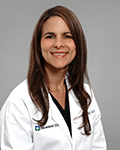
Isabel Ramati, MS, CCC-SLP
Speech-Language Pathologist
Division Manager
Isabel completed her Bachelor of Arts at Florida International University and her Master of Science in Speech-Language Pathology at Florida Atlantic University. Isabel joined Cleveland Clinic in 2023. Her clinical interests include evaluation and rehabilitation of speech, language, and aerodigestive disorders in adults with neurological impairments. Isabel also provides treatment for patients with head and neck cancer, from diagnosis through survivorship, as part of a multidisciplinary team.
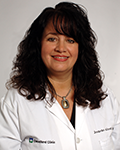
Jeanene Alessi-Graziano, MS, CCC-SLP
Speech-Language Pathologist
Jeanene completed her Bachelor of Arts at the City University of New York-College of Staten Island and her Master of Science in Speech-Language Pathology at Nova Southeastern University. Jeanene joined Cleveland Clinic in 2011. Her clinical interests include evaluation and rehabilitation of speech, language, cognition and swallowing for adults with neurological disorders.

Shoshana Bielich, MS, CCC-SLP, CBIS
Speech-Language Pathologist
Shoshana completed her Bachelor of Arts degree in Sociology at Florida Atlantic University and her Master of Science degree in Communication Sciences and Disorders at Nova Southeastern University. She has experience working in acute care, inpatient rehabilitation, and outpatient settings. She joined Cleveland Clinic in 2021 and is a Certified Brain Injury Specialist. Her clinical interests include adult dysphagia, aphasia, and cognitive impairments.

Jennylee Diaz, MS, CCC-SLP
Speech-Language Pathologist
Jennylee is a bilingual Spanish-speaking speech-language pathologist and voice specialist specializing in the evaluation and treatment of voice and upper airway disorders. She completed her Master’s degree at the Massachusetts General Hospital Institute of Health Professions and completed her fellowship at the University of Wisconsin-Madison Hospital and Clinics. She joined Cleveland Clinic in 2021. Her clinical interests include the aging voice and disorders that affect the speaking voice.

Brittany Hendrix, MS, CCC-SLP
Speech-Language Pathologist
Brittany completed her Master of Science degree in Communication Sciences and Disorders at Nova Southeastern University. She has experience working in acute care, inpatient rehabilitation, and outpatient settings. She is a bilingual Spanish-speaking speech-language pathologist. Her clinical interests include head and neck cancer, dysphagia, and neurogenic speech disorders.
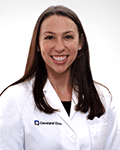
Jaclyn Keats, MS, CCC-SLP
Speech-Language Pathologist
Jackie completed her Bachelor of Science in Communication Sciences and Disorders at the University of Central Florida and her Master of Science in Speech-Language Pathology at Nova Southeastern University. Jackie joined Cleveland Clinic in 2024. Her clinical interests include assessment and treatment of swallowing, speech/language, and cognitive disorders in the acute care and outpatient settings.
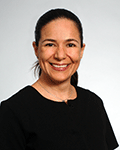
Jimena Ojeda, MA, CCC-SLP, CBIS
Speech-Language Pathologist
Jimena completed her Bachelor of Science in Audiology and Speech Pathology at Florida State University and her Master of Arts in Communicative Disorders with a bilingual certification at San Diego State University. She joined Cleveland Clinic Florida in 2019. Her clinical interests include speech, language, cognition, and swallowing impairments in adults with neurologic disorders.
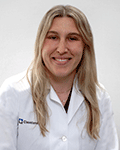
Alexa Weiss, MS, CCC-SLP
Speech-Language Pathologist
Alexa completed her Bachelor of Arts degree in Communication Sciences & Disorders at the University of Pittsburgh and her Master of Science degree in Speech Language Pathology at the University of South Florida. She joined Cleveland Clinic in 2023. Her clinical interests include dysphagia and upper airway disorders.
Appointments & Locations
Make an appointment at a Cleveland Clinic location in Florida.
Location
Weston Hospital
2950 Cleveland Clinic Blvd
Weston, FL 33331
Desk 14/15
